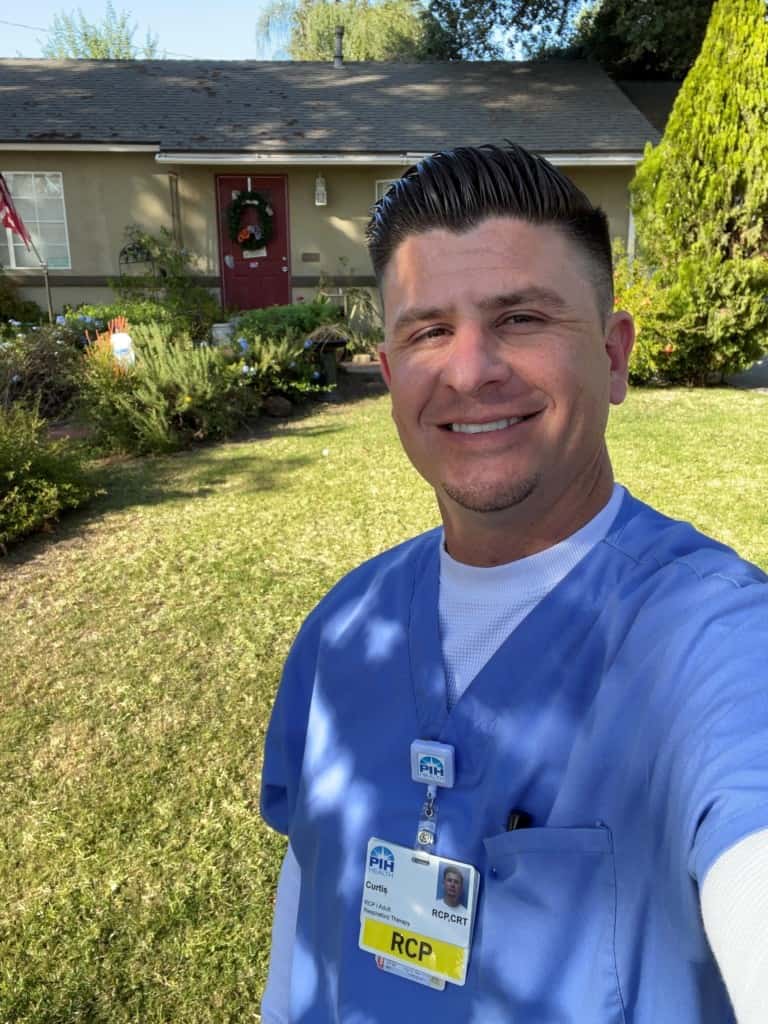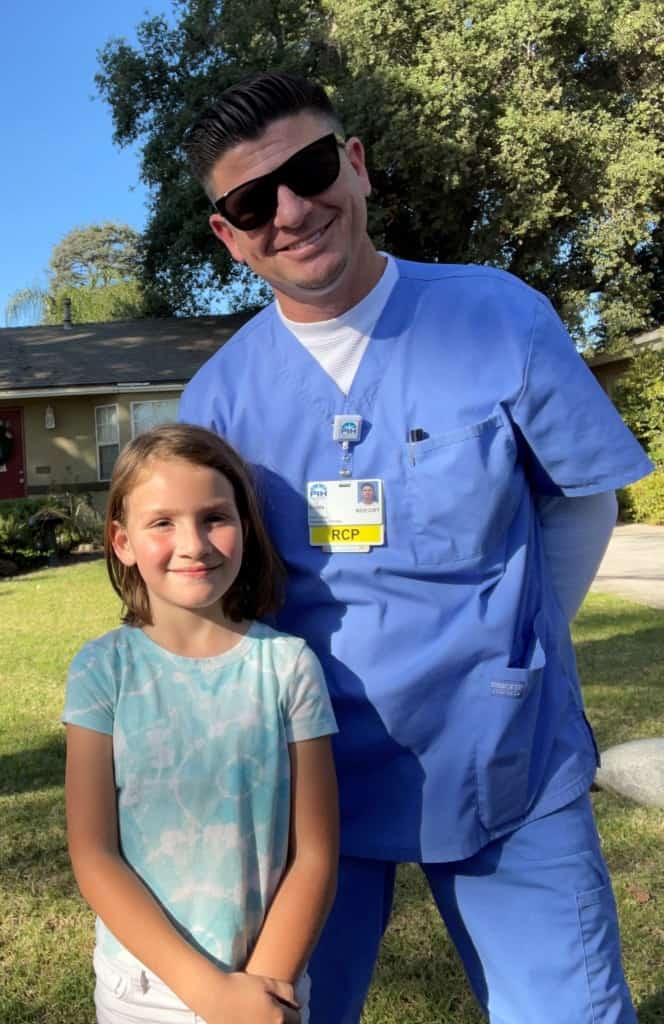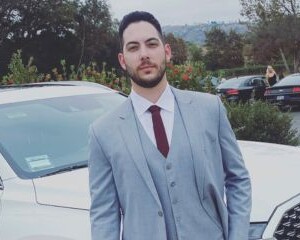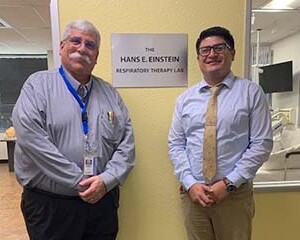Grad Q&A with Respiratory Therapy graduate Curtis Stanton
 As a lineman who was comfortable suspended a hundred-plus feet in the air, Curtis Stanton was a little intimidated about his job search as a newly certified Respiratory Therapist. Even though he also had an Emergency Medical Technician license to make an easier connection to his new career, at 42-years old, he dreaded the process of finding a position match, communicating his qualifications, and securing the job offer.
As a lineman who was comfortable suspended a hundred-plus feet in the air, Curtis Stanton was a little intimidated about his job search as a newly certified Respiratory Therapist. Even though he also had an Emergency Medical Technician license to make an easier connection to his new career, at 42-years old, he dreaded the process of finding a position match, communicating his qualifications, and securing the job offer.
Curtis was surprised to find that SJVC’s Career Services Department on the Ontario campus was way ahead of his anticipated job search scramble.
What were your greatest fears about a job search in your new field?
As someone who hasn’t had to look for a position in a very long time, I couldn’t tell you the last time I’d gone on an actual interview. And I wanted to find a really good situation.
What kind of support did you get from SJVC’s Career Services department?
Nicole Kelly (Career Services Representative) did every bit of the legwork from walking me through my resume and how to answer interview questions to actually bringing the jobs to me. She walked me through employer’s expectations and gave me good information for how to pivot toward points I should want to make.
It’s not often I can say one individual helped me so much in the course of just a week. I started to look for work the first week of August and by the 17th I was offered the position of Respiratory Care Practitioner at Presbyterian Inner Hospital (PIH) Good Samaritan. I don’t believe I would have gotten the job without her advice and guidance. She was genuine, kind, professional and followed up every single time she said she would – without fail and on time.
I am not the type of individual that heaps praise on people for doing their job. But Nicole went above and beyond due to her great attitude and genuine approach.
Did the Respiratory Therapy program give you the skills and knowledge you needed for the job?
I was a ‘Covid graduate’, so a lot of our work was online for a while. When we finally got back into the classroom and to do our labs, we got to put those things we learned into actual production. The teachers are genuinely interested in your investment, so they were probably holding our hands a little more.
I still passed my Boards with no issues. SJVC still did right by us.
You learn professionalism, a dress code, to carry yourself in a certain way and to perform your job with confidence. SJVC gave that message to students from Day One, and that’s what I liked a lot.
Did you start SJVC’s Respiratory Therapy program with some level of confidence?
As an EMT rescue climber I ran into Respiratory Therapists a lot and would talk with them about where they went to school and how they liked it. Some went to SJVC where they got an Associates degree and were eligible to continue on to a Bachelor’s, instead of just getting a certificate somewhere else.
I had met with the RT Program Director at SJVC, and I thought she was really genuine. She took pride in the professionalism of Respiratory Therapists. The equipment was nice, the teachers professional and that set a standard of being a good representative of this career right off the bat.
 What motivated you to make a career change a little later in life?
What motivated you to make a career change a little later in life?
When you’re younger you just want to make money. But as a lineman (rescue climber) I was gone all the time, sometimes on a tower in another state. Now, my wife, Catherine, was working nights as a nurse and I didn’t want to miss the same things with our daughter, Charlotte, (8) as I’d missed with our older kids, Matthew (25) and Alyssa (22). And, as you get older you want to model good choices for your kids.
With my EMT license, Respiratory Therapy would be an easy job for me to get into. And being around other Respiratory Therapists and hearing their stories, it was interesting and fun.
What was the hardest part about going back to school?
SJVC definitely ignited the fire. But you have those doubts. Am I smart enough? What if I don’t like this? What if nobody hires me? Turns out school is the easy part. The hard part is everything surrounding it. Life. Family, job, car, gas. Those were the hurdles in front of school.
But, finding something you love is meant for everybody. And school is meant for anyone to be able to have that. There’s never a perfect time. You just have to commit to doing it.
What is your typical day like as a Respiratory Therapist?
I work three 12-hour days/week and have different duties depending on if I’m in the ICU (Intensive Care Unit), ER (Emergency Room) or ‘on the floor’. I spend most of my time in ICU checking on patients’ conditions, their ventilators, blood gasses and treatments and communicating with doctors, giving updates on patient treatment and getting their adjustments.
Do you plan to expand your profession or continue your education?
More education is never a mistake. I just enrolled in an online Bachelor’s program and it should be completed in a little more than a year. My endgame, ideally, is to get my Master’s (degree) or to become a Physician’s Assistant (PA).
What advice would you give to new SJVC students?
Spend the 15-20 minutes working with Career Services on your campus. Returning their calls is not like a homework assignment. They’re going to help you find a job when you’re done with your program. Explain what you’re looking for, what you need. This will give you the opportunity to get employment right away. This is about you, about investing in yourself. Why wouldn’t you want to take advantage of every avenue. This goes back to the same thing: You get what you put into it.
Read Our Career Guide On Respiratory Therapy
Respiratory therapists care for individuals affected by respiratory diseases, like asthma and COPD, and other causes of breathing difficulties.
You might also like
More stories about
Request Information
All fields using an asterik (*) are required.


